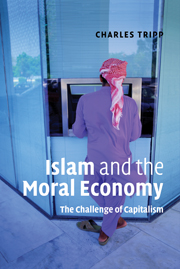3 - Islamic socialism
Published online by Cambridge University Press: 08 January 2010
Summary
In much of the writing associated with the Islamic social critique of the 1940s and early 1950s, a decisive role had been assigned to the state. It was the state which would both defend society against the depredations of capitalism and lay the foundation for its Islamic reassertion. This not only followed the line of reasoning mapped out in the early part of the century, but also reflected the changing political economy of much of the Islamic world. The peoples of the Islamic world and the Middle East had experienced capitalism through the intrusion of the modern state as the vehicle of a capitalist order, despite the dominant liberal myth of capitalism freeing people from state regulation. It was the state which embodied a certain kind of power and which provided the legal framework for the flourishing of capitalism.
With the movements of decolonisation, national independence and state development that marked the 1950s and 1960s, it was not surprising that the newly sovereign states in the Islamic world should have been seen as having the potential to fulfil the role given to the idealised state in the arguments on social reform. By the same token, governments from Algeria to Iraq found in the writings of the Islamic social critics a rich source for a vocabulary of authentication and justification in an idiom which had wide popular appeal.
- Type
- Chapter
- Information
- Islam and the Moral EconomyThe Challenge of Capitalism, pp. 77 - 102Publisher: Cambridge University PressPrint publication year: 2006
- 1
- Cited by



